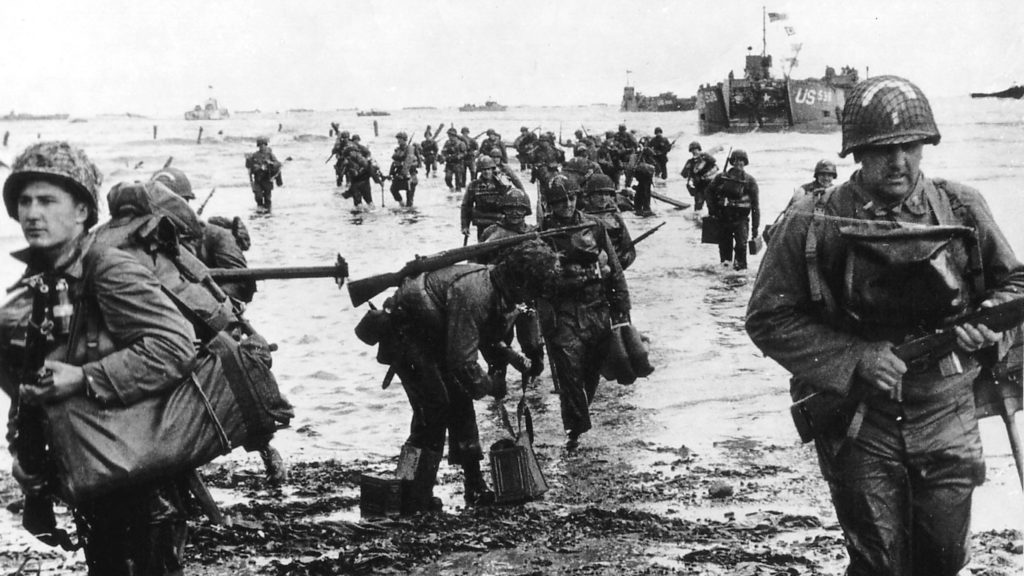“The strict conditions for legitimate defense by military force require rigorous consideration. The gravity of such a decision makes it subject to rigorous conditions of moral legitimacy.” (CCC 2309)
The Catholic Church’s “Just War” theory is like the classic novel “Moby Dick” — they are both mammoth tomes filled with wisdom that too few people read. For things like the 80th anniversary of the 1944 D-Day invasion, the theory helps us understand exactly what we were celebrating in Europe and back here at home.
On a personal note, my wife and her sister went to Normandy to commemorate the day and honor the memory of their mother, who served as a nurse in the Army Air Corps during the war.
Granted, she never left the base in Kansas, but she did her part, and no German Wehrmacht troops got within 8,000 miles of Kansas while she was on duty. My uncle, on the other hand, also served in the Army Air Corps as the crew chief for a B-24 heavy bomber stationed in the UK, which played a more “kinetic” role in softening up German targets before, during, and after D-Day.
It has been said World War II was the “good” war. The line of separation between the opposing forces was never so well-defined in the unhappy history of human warfare. But the brutal reality is that all the bad done during the “good” war was not just from bad guys, but the good guys as well.
People like me, at the tail end of the Boomer generation, were weaned on war movies. We loved them. We played war every summer, based on whatever war movie we had seen. We were also too young to understand Vietnam, and too old for everything that followed.
One of my brothers was just the right age for Vietnam. Like many of his generation, he found himself carrying a high-velocity rifle and wading through rice paddies. Upon his return home, the damage that was done to his soul from real war experience was easy to see, if not so easy to diagnose in those days. Only through God’s grace, and, I am positive, my mother’s constant pestering of the Blessed Mother on his behalf, did he pull through. He lived a happy, faith-infused life, and raised a wonderful family.
Before my wife and her sister went to Normandy, I insisted they watch “The Longest Day,” an early 1960s star-studded epic about the D-Day invasion. It still holds up, although like all war movies before and after, it truly pales in comparison to what real wartime carnage is like. But at least it gave some good factual background for my wife and her sister as they encountered Omaha Beach.
And the facts of that day were staggering: 150,000 American and Allied troops were put ashore. More than 4,000 of those men died on that day. Thousands more were wounded and maimed for life. On the other side, the German forces were slaughtered at almost double the numbers.
The horrors of the “good” war did not begin on that 12-mile stretch of sand and rocks, and more were to come. My uncle believed he was bringing a horrible war to an end against a homicidal enemy in the fastest way possible. But the argument can be made — and has been — that what the United States 8th Air Force did to German cities was a blatant violation of the Catholic “Just War” theory. Arguing a point more than 80 years old is futility on stilts, and I would not dishonor the memory of my uncle who sacrificed so much.
Instead, let us pray for all the uncles and fathers, brothers and sons, and now the aunts, mothers, sisters, and daughters who have fallen in any conflict. We honor them all best by cracking open that Catechism gifted to us by the Church and reading what could be read aloud in every military cemetery in the world.
“The Fifth Commandment forbids the intentional destruction of human life. Because of the evils and injustices that accompany all war, the Church insistently urges everyone to prayer and to action so that the divine Goodness may free us from the ancient bondage of war.” (CCC 2307)

